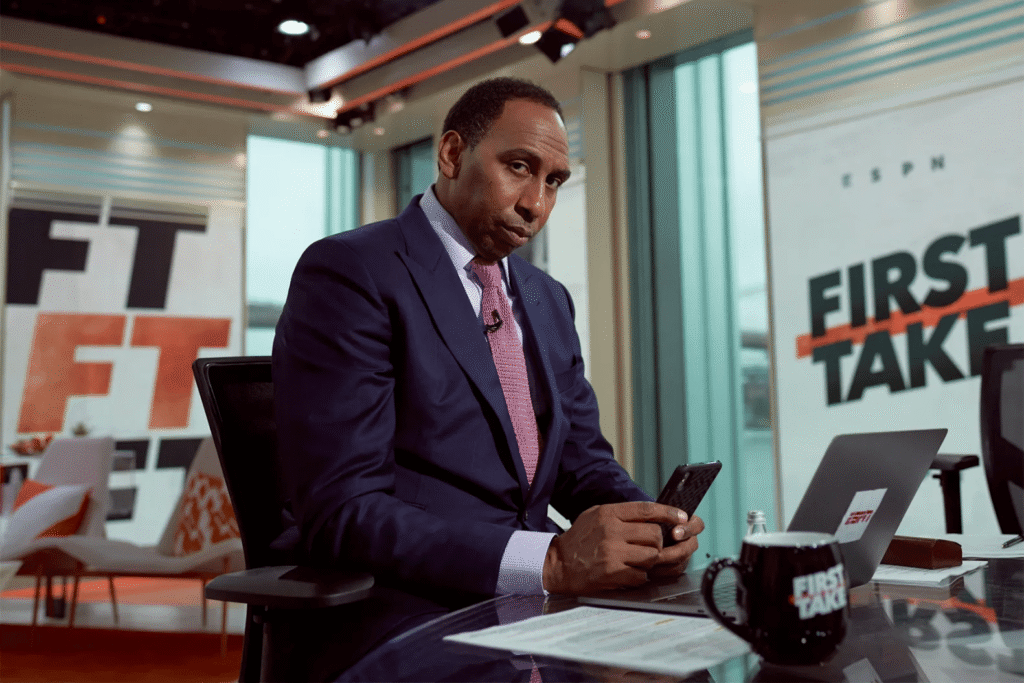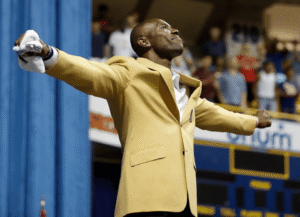NBA Insider Slams Stephen A. Smith Labels Him A “Manufactured Tough Guy”
An NBA insider has publicly slammed Stephen A. Smith, labeling him a “manufactured tough guy” and challenging his authenticity as a sports analyst.

Courtesy of ESPN
In an era where sports media personalities often blur the lines between analyst and entertainer, an anonymous NBA front office source is not shying away from criticizing ESPN’s top on-air talent, Stephen A. Smith.
In his candid, unfiltered dialogue with LandonBuford.com, the executive slammed Smith for a carefully crafted, unauthentic image fueled by industry privilege and corporate compliance, rather than genuine life experiences or basketball credibility.
“Stephen A. talks like he’s a battle-tested soldier from the streets of Queens,” the source said. “But everybody in this league knows he was never outside. He wasn’t grinding in gyms. He was in classrooms, not in the trenches. He’s a product—not a peer.”
From Debate Club to Debate Desk: The Myth of Street Cred
Stephen A. Smith‘s history is characterized by tough talk and street references, but those who have witnessed his rise in the industry argue that the narrative does not accurately reflect reality. The anonymous NBA insider pointedly questioned Smith’s repeated reference to hardship and struggle, calling them TV theatrics rather than grounded truth.
“There’s nothing wrong with being raised with structure, love, and guidance—but don’t twist it into a ‘from-the-block’ narrative when the cameras roll,” the source continued. “He’s not an OG. He’s a suit.”
Smith’s role as cultural gatekeeper and his use of performative bravado to assert himself as the voice of the people, especially Black athletes, creates a recurring theme of contradiction. However, according to insiders, it is a persona created to serve ESPN’s interests rather than the communities it claims to represent.
Stephen A. Smith And the Athletes: Manufactured Smoke and Selective Outrage
The source also highlighted the pattern of selective aggression that Smith demonstrates on TV, especially when it comes to Black NBA players.
“He’ll annihilate Kyrie Irving for missing a media day, but barely criticize a front office for mishandling a star,” the insider said. “He yells at players for being human but praises execs for being ‘calculated.’ That’s not balance. That’s branding.”
The Source added that Smith creates narratives to increase ratings, rather than reflecting actual basketball IQ or strategic insight.
“He’s not breaking down zone defense adjustments or cap strategies. He’s performing—because that’s what ESPN pays him to do.”
The Culture’s Voice or ESPN’s Corporate Puppet?
While Smith claims to speak for the culture, the anonymous front office executive painted a far different picture: one of a network spokesperson who adjusts his energy depending on ESPN’s corporate objectives.
When controversy is needed, he screams.
When calm is profitable, he praises.
When a Black athlete speaks out, he scrutinizes.
When ownership is in the wrong, he treads lightly.
“He’s ESPN’s version of hip-hop,” the source said. “Looks the part, talks the slang, but it’s packaged for advertisers, not authenticity.”
They argue that this separation is not only harmful to viewers but also to athletes who depend on the media to tell their stories honestly and without corporate filters.
First Take vs. First Truth: The Shift from Journalism to Entertainment
The NBA source was not finished.
“Stephen A. hasn’t been a journalist in over a decade. He’s a character—an actor playing the role of an analyst.”
Both fans and players express a growing sentiment that sports commentary has become a space of loud opinions, manufactured drama, and little or no substance. First Take once a sports debate show, has transformed into a scripted entertainment show that features catchphrases, viral rants, and predictable narratives.
“It’s not about being right—it’s about being loud,” the insider concluded.
Few players have publicly criticized Stephen A. Smith, their silence is a powerful statement. According to the source, Smith is no longer respected or trusted by many current NBA athletes due to the perception of exaggerated performances and disloyal coverage.
“They see through it. They know who’s real and who’s reading a teleprompter with fire in their voice and fear in their heart,” they said.
The source claims that Smith’s influence in locker rooms is rapidly declining. “He’s not welcome in a lot of circles anymore. Not because he’s critical—but because he’s disingenuous.”
The Call for Accountability in Sports Media
The front office insider’s final message was straightforward: the sports industry demands more accountability, nuance, and truthfulness.
“We’re not asking for soft coverage. We’re asking for real coverage. There’s a difference between challenging athletes and exploiting them for clicks.”
They advised fans to demand more from sports talk programming, to stop rewarding quantity over quality, and to regain authenticity in an industry that is drowning in personalities and void of real perspective.
Conclusion: Stephen A. Smith is the Network’s Star—But Not the Game’s Voice
The bluntness of this anonymous NBA insider raised genuine questions about how sports narratives are shaped in the modern media landscape, whether one agrees with it or not. It’s crucial to question who is telling the truth when the loudest voice becomes the most trusted by default. The era of unchecked, performative commentary may be about to expire in a world in which athletes are increasingly empowered to control their own stories.
Before the source hung up the phone, they shared, “Stephen A. Smith Is the biggest clown in sports.”
Landon Buford is an accomplished sports and entertainment journalist based in Richardson, Texas, with over a decade of experience covering the NBA, WNBA, NFL, WWE, MLB, and the entertainment industry. Known for delivering high-impact stories and headline-making interviews, Buford has earned a global audience through content that blends insider access with compelling storytelling.
He previously served as director of editorial and brand communications at PlayersTV, where he helped shape the platform’s editorial voice and brand identity. He is also the founder and editor-in-chief of LandonBuford.com—an independent outlet with more than 1.6 million views and syndication from major platforms including Bleacher Report, Sports Illustrated and Yahoo Sports. Buford’s interviews with stars like Gary Payton, Kevin Durant, Mark Cuban and Chris Paul showcase his talent for meaningful, in-depth conversations.
His bylines have appeared in Sports Illustrated, Forbes, Heavy.com, Meta’s Bulletin and One37pm, where he has contributed exclusive interviews, breaking news and cultural insights. At Heavy.com, his work drew more than a million views in just eight months, and at One37pm, it contributed to record-breaking traffic numbers.
His work highlights the intersection of sports, fashion, music, and entrepreneurship—showcasing how athletes and entertainers use their platforms to inspire change, influence trends, and shape culture beyond the game. Landon has interviewed a wide range of figures from the NBA, NFL, and entertainment industries, consistently bringing authentic voices and untold stories to the forefront.
In addition to his journalism, Buford is an entrepreneur and content creator, dedicated to amplifying diverse narratives and driving meaningful conversations across media platforms. His passion for storytelling, culture, and innovation continues to make him a respected voice in the evolving landscape of sports and entertainment media.





